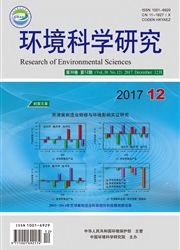

 中文摘要:
中文摘要:
以1998年和2009年的TM/ETM影像及各种土地利用驱动因子数据为基础,采用Binary Logistic及CA-Markov模型对延安市宝塔区城乡过渡区的土地利用类型进行了模拟和预测,并用GS+9.0和ArcGIS 9.3软件对该城乡过渡区1998年、2009年和2020年的土地利用生态风险指数进行了时空异质性分析.结果表明:①以Binary Logistic模型得到的2009年的各土地利用类型概率图作为CA-Markov模型中的适宜性图集,模拟2020年各土地利用类型的ROC值(Logisti C回归检验值)均达到0.70以上.②由2020年土地利用模拟结果可知,建设用地和耕地变化最为明显,其中建设用地增幅18.64%,耕地减幅15.42%,二者增减的幅度相近.③对土地利用生态风险异质性的分析可知,以人类活动为主导的土地利用方式改变了原有土地利用空间结构,严重危害了土地利用的景观完整性和结构性.④2009─2020年该城乡过渡区整体生态风险呈高风险分布态势,生态风险指数由2009年的0.06增至2020年的0.66.
 英文摘要:
英文摘要:
Based on image data of Landsat TM/ETM in 1998 and 2009 and the other data with multiple driving factors, the land uses were simulated and predicted by Binary Logistic and CA-Markov models. Subsequently, the temporal and spatial heterogeneity distribution of land use in urban fringe of Baota District of Yan'an City in 1995, 2009 and 2020 were analyzed through the eco-risk indices using softwares of GS + 9.0 and ArcGISg. 3. The analyzed results showed : 1 ) The land use probability map in 2009 calculated from the Binary Logistics model was used as the Suitability Atlas in the CA-Markov model to simulate the results in 2020. The ROC values of land use types in 2020 were over than 0.70. 2) The simulated results of land use in 2020 indicated that 18.64% of decrease in the arable land and 15.42% of increase construction land were significantly and negatively correlated. 3 ) The analysis of the heterogeneity of land use eco-risk showed that the integrity of the landscape and land use structures were seriously affected by the change of the spatial structure of the original land use, which patterns of land use were dominated by human activities. 4) The entire eco-risk of urban fringe appeared to be a highly risk distributed from 2009 to 2020, with eco-risk increase from 0.06 in 2009 to 0.66 in 2020.
 同期刊论文项目
同期刊论文项目
 同项目期刊论文
同项目期刊论文
 期刊信息
期刊信息
